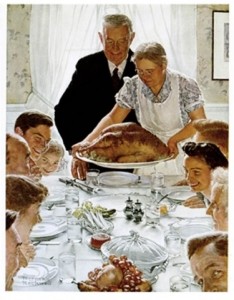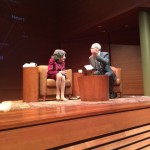The problem of ageism is coming out of the shadows and into the public eye. I had the opportunity to be part of a  fascinating panel hosted by The Atlantic, where we discussed the growing problem of age discrimination and what can be done about it. I was able to talk about my work with the World Health Organization, which is working to combat ageism around the world. Please share your thoughts on this important issue!
fascinating panel hosted by The Atlantic, where we discussed the growing problem of age discrimination and what can be done about it. I was able to talk about my work with the World Health Organization, which is working to combat ageism around the world. Please share your thoughts on this important issue!
Author Archives: Karl
Elder Wisdom, the Pope, and 30 Lessons for Living
I have to admit that I never expected to be compared to  Pope Francis! Now if I am totally honest, I wasn’t exactly compared to the Holy Father. However, my book, 30 Lessons for Living, was just favorably compared to a book by Pope Francis and Friends, which still feels pretty flattering. And the Pope’s book is a very interesting one.
Pope Francis! Now if I am totally honest, I wasn’t exactly compared to the Holy Father. However, my book, 30 Lessons for Living, was just favorably compared to a book by Pope Francis and Friends, which still feels pretty flattering. And the Pope’s book is a very interesting one.
Pope Francis published a earlier book with his answers to children’s questions. He followed it up with this one:
Now in his 80s, Francis has published Sharing the Wisdom of Time, along with 250 interviewees, as well as editors and writers at Loyola Press and elsewhere — curated by Jesuit Fr. Antonio Spadaro, editor-in-chief of La Civiltà Cattolica.
Ranging in age from their 60s to their 90s, the participants muse on the meaning of events in their lives that relate to work, struggle, love, death and hope as they share pivotal moments and the lessons learned.
Both wealthy and poor, educated and unskilled, the participants had worked as farmers, historians, teachers, recyclers, priests, pastors, chefs, nurses, writers and film directors, among other occupations. There’s also a 98-year-old veteran (he died several months before this book was published), who reminiscences about his bombing runs during World War II.
Whether Catholic or not, the book is of interest (and possibly inspiration) to anyone interested in elder wisdom and how it can transform our lives.
Make Thanksgiving “Elder Wisdom Day!”
Once again this year, I propose a new holiday. Or rather, a new use for an old holiday. I believe that we should make Thanksgiving the day when we  celebrate elder wisdom by asking older people to tell us their advice for living. Here’s why.
celebrate elder wisdom by asking older people to tell us their advice for living. Here’s why.
Occasionally, the question runs through younger people’s minds (whether they admit it or not): What are old people good for? Our society’s unremitting ageism portrays older persons as sick, frail, unproductive, and even the culprits for busting the federal budget.
Earlier retirement and increased residential separation of older people has broken age-old contacts between the generations. Indeed, our society has become extraordinarily segregated by age, such that young people’s contact with elders is almost exclusively within the family (and even that is limited). Combined with the persistently negative images in the media, this question – What good are old people? – lurks in the background.
But the answer is amazingly simple. For as long as humans have been humans, older people have played critically important roles as advice-givers. Indeed, anthropological research shows that survival in pre-literate societies was dependent on the knowledge of the oldest members. It’s easy to forget that it is only in the past 100 years or so that people have turned to anyone other than the oldest person they knew to solve life’s problems.
Now here’s the important point: Old people are still a unique source of advice for living for younger people. And we need to tap this source much more vigorously than we are currently doing — both for young people’s sake and that of our elders. That’s why I’m proposing that we make learning elder wisdom a part of our families’ Thanksgiving holiday.
We often do ask our elders to tell their life stories. But that activity is very different from asking their advice. You don’t just want their reminiscences; what’s truly valuable are the lessons they learned from their experience and that they wish to pass on to younger generations.
Now for the holiday. Thanksgiving is something most Americans celebrate, regardless of religious persuasion. And it’s the one time in the year when families are most likely to gather — and include their older relatives. What if we all take a half hour (okay, it can be before or after the football game) to consult our elders about their lessons for living?
Your children are the best ones to start this conversation and they can ask questions that are highly relevant to them. Is Sammy concerned about bullying? Some elders (especially immigrants) were ferociously bullied as children. Is Pat concerned about finding the right partner? You have elders who have long experience in relationships, but who are rarely asked for their advice about them. Are your college kids worried about the job market? If so, how about advice from people who went through the Great Depression?
Remember that this is different from asking Grandpa “What did you do in World War II?” or Grandma “What was life like in the Depression?” The goal is to genuinely and interestedly ask for advice: “What lessons for living did you learn from those experiences?” Taking this approach elevates the role of elders to what they have been through most of the human experience: counselors and advisers to the less-experienced young.
Give it a try on Thanksgiving (and let me know how it went!). Here are some questions to get you started; it can help to send these in advance to your elders so they can ponder them a bit. We’ve used these questions in interviews with hundreds of elders in the Legacy Project, and they work very well). More information is available in the book 30 Lessons for Living.
So let’s declare Thanksgiving (or a part of it) Elder Advice-Giving Day. Our elders won’t be here forever, so this year is a good time to start!
Questions for the elders:
- What are some of the most important lessons you feel you have learned over the course of your life?
- Some people say that they have had difficult or stressful experiences but they have learned important lessons from them. Is that true for you? Can you give examples of what you learned?
- As you look back over your life, do you see any “turning points”; that is, a key event or experience that changed over the course of your life or set you on a different track?
- What’s the secret to a happy marriage?
- What are some of the important choices or decisions you made that you have learned from?
- What would you say you know now about living a happy and successful life that you didn’t know when you were twenty?
- What would you say are the major values or principles that you live by?
Now add your own!
And if you would like more ideas, I was interviewed by NPR with one of our wonderful Legacy Project Elders about holidays and elder wisdom. You can listen here.
Jeanie, 90, An Inspiration to Girls Everywhere – Our Intern Reports!
We are so lucky at the Legacy Project to have wonderful student interns who join us to learn about aging issues, and elder wisdom in particular. We ask them to profile lessons from an elder they interview. Emily Hoyt is a junior  at Virginia Polytechnic Institute and State University, majoring in Human Development. Here’s what she learned from Jeanie.
at Virginia Polytechnic Institute and State University, majoring in Human Development. Here’s what she learned from Jeanie.
Jeanie, age 90, has lived and continues to live an incredible life. Born in 1927, Jeanie overcame adversity to become a successful career woman. According to Jeanie, “you could be a secretary, a nurse, or a teacher; that was about it.” Jeanie broke out of these traditional roles by going back to school in her thirties to complete her undergraduate degree and receive a graduate degree in Art History. She noted:
If I hadn’t made that decision, I wouldn’t be where I am now.. One of the reasons I made it was because I had a group of friends, our husbands were successful, and we weren’t quite sure what we were doing. One of them said ‘You know when you get between 35 and 45 you either just gel and become frozen into what you are, or you really develop,’ and I thought, “Oh my God!”
Inspired to go back to school, Jeanie pursued her dream of completing an arts education. Because careers in art are hard to come by, Jeanie found the collegiate atmosphere “backbiting and competitive.” This pressure, however, taught Jeanie “how to handle [her]self and handle other people.” A great life skill for anyone in any field of study.
Jeanie told me that going back to school “absolutely was a life changer.” Her advice to girls today? Take advantage of every opportunity you are given. According to Jeanie, “the horizon [for girls] is so much greater now.” She advises girls to capitalize on the groundwork laid by previous generations of women.
After a successful 25-year career as a museum curator, Jeanie has learned a thing or two about working life. The saying “if you love what you do, you never work a day in your life” rings true for Jeanie. In fact, Jeanie felt “guilty about being paid for her job.” The intrinsic benefits she received from her job were payment enough.
Jeanie serves as an example for girls everywhere of breaking barriers and further progress for women. As women, it is our job to continue down the path that Jeanie has paved for us. We must jump at opportunities and continue to chip away at the glass ceiling until it shatters.
Having Trouble Facing Monday? Listen to this Elder!
I’ve been doing a lot of traveling, and I was a bit overwhelmed looking forward to the coming week. Don’t get me wrong – I  love my job. But facing the emails and tasks that are waiting can take a bit of the usual spring out of one’s step.
love my job. But facing the emails and tasks that are waiting can take a bit of the usual spring out of one’s step.
So I went back to the Legacy Project Elders, and I found what I needed. Flora, 80 and still very active, suggests the following idea. I’m trying it tomorrow (and I feel better already)!
Flora’s approach to living is to embrace the pleasures each day holds, and she reinforces that attitude with a daily habit:
I like to start out the day with a list of ten things that I’d like to do that day. Now, I’m not going to accomplish all of them and probably only one of them is going to work out, but I never know which one, at the beginning of the day. It’s not a “to do” list—it’s just a list of what I would like to try doing. I’m always looking for new things to try. They don’t have to be difficult things—I’m probably not going to take up hang gliding or something like that. Something simple. Finding new opportunities and new challenges each day.
If I were to give any particular word of advice, I would say, go about the business of the day, humdrum as it might be, but walk on your tiptoes, waiting for the “aha!” experiences. That happens when you’re going around the corner doing the normal, everyday things. So be prepared for those “aha!” experiences that may happen anytime. That way you’re always open to, and watching for, something different—watching for a feather from an angel’s wing.
Edwina’s Advice about Growing Old: “Find the Magic!”
Edwina Elbert, 94, on the adventure of aging:
I tell people:
“Each person born has been chosen by fate from a trillion possibilities. How then can you complain of bad luck when you have won the greatest lottery of them all?”Now isn’t that true?
People have to learn to be thankful. To see the wonders of this world – you know, we are here for such a short time. I didn’t realize I was old until I was ninety years old. There’s still so much to see and so much to read, and so much to learn. We should be thankful that we’ve had this opportunity to live. It’s strange about this…the way that it’s all set up so that we only have a certain length of time. But we’re lucky. Aren’t we lucky to have seen the Empire State building and all of this stuff?
My advice about growing old? I’d tell them to find the magic. The world is a magical place in lots of ways. To enjoy getting up in the morning and watching the sun come up. And that’s something that you can do when you are growing older. You can be grateful, happy for the things that have happened. You should enjoy your life. Grow a little.
Just because you’re getting older doesn’t mean that you need to stop growing. I used to think that when you got old you sat back in a rocking chair and let the world go by. Well that’s not for me and that’s not for a lot of people. I can’t dance anymore, but if I could I would.
There’s no reason for anybody in this world to ever be bored. That’s one thing I’ve always said. Well if I died and went to heaven, I’d be bored to death with how they say heaven is. There’s no need for you to be bored in this world. There’s so much out there. And your attitude, be optimistic. I’ve been optimistic all my life. Even as a little girl I can remember that no matter what happened it would turn out all right. In this country almost everybody is taking antidepressants. Why in the world are people taking antidepressants? It should be a wonderful world. Mine has been a great ride, believe me.
Me, Tao Porchon-Lynch, and Having the Best Day Every Single Day
My involvement in the Legacy Project has brought me some wonderful experiences, but none beats my “wisdom  dialogue” last Saturday with the amazing Tao Porchon-Lynch. As the New York Times declared in a feature article this month, Tao is the “98-year old yoga celebrity” with an incredible life story: professional dancer, model, actress; associate of notables from Ghandi, to Hemingway, to Noel Coward, to Marilyn Monroe, to the Maharishi Mahesh Yogi. And she’s in the Guinness Book of world records as “oldest yoga teacher,” keeping a full schedule of classes (despite a hip replacement). And she started a prize-willing career as a competitive ballroom dancer at age 87. Talk about “successful aging…”
dialogue” last Saturday with the amazing Tao Porchon-Lynch. As the New York Times declared in a feature article this month, Tao is the “98-year old yoga celebrity” with an incredible life story: professional dancer, model, actress; associate of notables from Ghandi, to Hemingway, to Noel Coward, to Marilyn Monroe, to the Maharishi Mahesh Yogi. And she’s in the Guinness Book of world records as “oldest yoga teacher,” keeping a full schedule of classes (despite a hip replacement). And she started a prize-willing career as a competitive ballroom dancer at age 87. Talk about “successful aging…”
The wonderful Rubin Museum in New York City brought Tao and me together in their”Wisdom Matrix” series, to discuss “The Secret to a Good Life.” It was a true peak experience to sit with someone who marched with Ghandi, lived through the Blitz in London, and went on to become a contemporary spiritual master. We covered a wide range of topics in our discussion, but for me the most striking thing was Tao’s unabashedly positive approach to life. She consciously rejects fear and instead focuses on breathing, exhorting us to feel the “breath of life” that connects us with all other humans. She declares each morning that the day at hand will be “the best day,” and lives her life that way.
As someone who came as close as one can to failing a yoga class, she did an amazing shoulder stand that would have put me in the orthopedic unit.
The video of the discussion will come out soon. In the meantime, I recommend Tao’s book, Dancing Light: The Spiritual Side of Being through the Eyes of a Modern Yoga Master. It interweaves Tao’s extraordinary life with her spiritual insights.
Your Relationship Advice Needed: Can You Help Our Reader?
Dear Readers,
In the past you have come up with great advice for people who wrote to the Legacy Project blog asking for advice. Can you help this young woman, below? Please comment with your advice and suggestions!
She writes:
My partner and I are very different. I used to think that being different people made the relationship exciting, but three years later it is starting to take a toll on my happiness. I am constantly asking myself whether this is the person I want to spend my life with – and I don’t know the answer to that anymore. I love him with all my heart but I feel like I am outgrowing him. I am very career-driven. I just graduated university and on my way up the career ladder, whereas he is 7 years older than me with no formal qualifications and an entry level laboring job. When I get home from work I want to have intellectual conversations and am excited to share what happened during the day. He would listen but it would go right over his head and he will say “Oh yeah, well anyways today…” and start talking about something else. It just discourages me so much. Before I used to be fine with him finishing a work week and having a beer with the boys but now a week finishes and I want to have a quiet night at home with him – but he is still adamant on spending time with the boys and having a beer. I am over it; I just feel like I really need someone on my level. We are similar in every other way, culture, sense of humor, family and religious values, but it’s other things that get me down and make me question the relationship. I don’t think this comment has any structure at all (complete brain fart) but anyway. I would like to hear about anyone’s experience who has bitten the bullet and chosen to accept a difference and if it actually helps or whether you are better off finding someone more compatible?
Please weigh in!
Three Tips for Making the Best of In-Law Relationships
In my surveys of over 700 long-married older people, I heard one lesson again and again: “You don’t just marry a person; you marry his or her family.” . Despite the fact that most dating couples do not spend much time thinking about their partner’s family, the elders tell you unequivocally: in-laws matter.
you marry his or her family.” . Despite the fact that most dating couples do not spend much time thinking about their partner’s family, the elders tell you unequivocally: in-laws matter.
It’s no coincidence that popular culture focuses so heavily on in-law relationships, from the meddling mom and dad in “Everybody Loves Raymond” to the “Meet the Parents” movies. These images reflect deep-seated worries about balancing loyalty to one’s spouse with life-long bonds of attachment and obligation to parents, siblings, and other kin. This worry is not an irrational one; research also shows that in-law relations are a key determinant of marital happiness.
But what should you do? As I combed through hundreds of reports of in-law relations — ranging from loving and respectful relationships to “in-laws from hell” — I uncovered three terrific lessons for insulating your relationship from problems with one another’s’ families. These rules for in-law relations have been tested by hundreds of the oldest Americans for decades — given what’s at stake, we should pay close attention.
Rule # 1: Your loyalty is to your spouse.
Life is full of difficult decisions in which no solution leaves everyone happy. Unfortunately, that’s exactly what a difficult in-law situation creates — a classic example of ambivalence that in a worst-case scenario may persist over years (or even a lifetime). But sometimes the elders cut through all the complexity and just tell you what to do. Here’s their advice on dealing with the supposed ambivalence of in-law relations:
In a conflict between your spouse and your family, support your spouse.
.
The elders are unequivocal; it is your duty to support your husband or wife and to manage your own family in a way that consistently conveys this fact. Further, you both must present a united front to both families, making it clear from the beginning that your spouse comes first.
In couples where this allegiance did not happen, marital problems swiftly followed. In fact, some of the bitterest disputes occurred over a spouse’s failure to support his or her partner. When I asked Erin, 66, to describe a conflict that came up in her marriage, she didn’t hesitate:
Oh yeah, his mother. A lot of conflict. I had the impression she didn’t like me very much. I could live with that, but my husband never stuck up for me, so we fought about it. The apron strings were tied to him, and you just didn’t go against Mommy. And we fought about it because he would say, “Oh you’re crazy, she never said that.” And I’d go, “I don’t believe you don’t believe me.” And arguments would start. And after it was over I’d say, you know, how stupid we’re arguing about this, God forbid we get divorced over her. My husband would never say anything like “Hey mom, that’s my wife, cool it.” I never got that.
So when there is conflict between your family and your spouse, don’t feel caught in the middle, because your place is on your spouse’s side. To do otherwise is to undermine the trust that is the underpinning of your marriage.
Rule # 2: Remind yourself why you are doing it.
This tip from the elders is one that many have used like a mantra in difficult in-law situations. Tell yourself this: the effort to accommodate your partner’s family is one of the greatest gifts you can offer in marriage. You are used to putting up with your own relatives and you have accommodated to their quirks and foibles. But now you have to do it all over again. The closest thing to a “magic bullet” for motivating yourself to put the effort into in-law relations, the elders tell us, is to remember that you are doing it because you love your spouse.
Most important, by staying on good terms with his or her relatives, you are honoring and promoting your relationship in one of the best ways possible. Gwen, 94 and married 67 years, puts it clearly:
You may not like your mother-in-law or your father-in-law or your in-laws very much but you certainly can love them and stay close to them. Remember that they’re your loved one’s family. I learned to love them. I mean, I loved them because they were my husband’s parents and I loved him.
Rule # 3: Eliminate politics from discussion.
Here’s a specific tip that could not be more relevant during this election season: Keep political arguments out of in-law relations. It can be the biggest bomb in the minefield, and the elders say that these conflicts are unnecessary. There is simply no need to attempt to engage your in-laws in political debates or to convert them.
Often, the urge is to make parents-in-law “really understand” what’s going on in society and to show them how irrational or wrong-headed they are politically. I heard many accounts of holiday dinners and family gatherings disrupted by debates over the President, the Congress, abortion, the death penalty, and on and on.
According to the elders, you may not be able to avoid conflict over your in-laws’ disapproval of your marriage, your job, your lifestyle, or how you raise your children. But you can make it a rule to take noisy and unnecessary political debates off the table. (Remember, we’re not talking here about a lively, enjoyable political discussion; I mean the kind that ends with slamming doors and a spouse crying in the car.)
Let’s return to Gwen for her advice. Gwen made in-law visits much more tolerable by following this lesson and cutting politics out of the interaction.
My husband didn’t care for my dad because my dad was a completely different kind of person compared to my husband. My dad was the boss of everybody and everything. He was never aggressive; he never hit us kids or my mother. But he was a total boss. What my dad said was law and order and we all knew it. And my husband was a gentle, soft-spoken, easy-going person who would rather die than make a fuss. He was a completely different personality. In particular, they didn’t see eye to eye about the government. My dad was a Democrat, my husband was a Republican. They’d get into those arguments.
So finally, I made the rule that there would be no discussions of politics when we were all together. And I said to my husband: “If Dad starts in about the Republicans, I’m going to walk out of the room and you come see what’s wrong with me because I don’t want to hear this anymore.” I guess that was the only problem in our early marriage. Of all the big decisions we had to make in marriage, I think the most important was deciding that I wasn’t going to listen to that problem between my father and my husband.
You may wish to apply this same rule to other “hot-button” issues (based on my own extended family, I’m tempted to include Red Sox versus Yankees…). When buttons are pushed on a repetitive and sensitive topic, leaving the room is an excellent — and potentially relationship-saving — option.
Get the Job Done: Sam’s Lessons on Work – From Our Intern!
We’re pleased to share with you the post from our second summer intern! Melanie Turner is a junior at  the University of Virginia, majoring in speech pathology and Spanish. She learned valuable insights from Sam about drive and commitment at work. Here’s her post:
the University of Virginia, majoring in speech pathology and Spanish. She learned valuable insights from Sam about drive and commitment at work. Here’s her post:
86-year-old Sam, a chemical engineer who worked for 42 years at the same company, believes that being successful in one’s career requires a willingness to see any task through to completion: In his view, work’s not just fun. Work is work, by definition, and to get ahead in this life you have to work hard.
Looking back on his life, Sam attributes his promotion in the company to working hard, even on undesirable assignments. He recalls that when top executives at his firm were faced with a challenging interpersonal situation, his reputation for being competent and dependable served him well.
Be known in the business for the person who can get it done. I was always that way. I remember we had some environmental problems in the company, and three professors from a local university had put together a proxy statement that we were going to have to send out to our shareholders. And there were Catholic nuns – you know, Catholic converts – and they felt we weren’t paying sufficient enough attention to environmental matters. Of course, a company doesn’t like to send out proxies like that to its shareholders.
So we went around the room with all the ten executives sitting there, and we said, “Hmm, now who’s going to handle this problem?” And I could see everybody sweating, because they were all good at interpersonal relations. You couldn’t be in that room if you weren’t. But it always ended up with me. They all took a big sigh of relief around the table: “Thank God he didn’t stop on me! Good old Sam can do it.
Sam identifies his dependability as one reason for his success. Even though he didn’t want to reason with displeased shareholders, he was willing to approach the task optimistically. This attitude earned him respect with his colleagues. In fact, when the company faced a difficult circumstance involving a law firm, Sam’s reputation for always doing his job well saved his career.
They hired a New York law firm, and the guy said “Well, the first thing you gotta do is get a fall guy and fire him,” so that everybody can say, “They’re taking positive steps.” So the CEO called me in and said, “Sam, here’s the deal: the first step they recommend is that I’d fire you.”
Sam told me he was frightened, but that he did not give up hope. After reading an article about the way a different company’s interim CEO proved his ability to serve as the permanent replacement, Sam decided to advocate for himself on the basis of his effort and dedication.
I cut this out of the newspaper, and brought it into the CEO: “You know, I think I am the best guy for the job. And I just read this article.” And this is what happened. He said, “I can’t believe you read that article, because I read the same article in Fortune, and I thought about you.” He said, “You are the best guy for the job.” That was the answer. It was over. A month later I was voted to be the vice president of corporation, and corporate officer.
Sam’s hard work, willingness to deal with unforeseen problems, and commitment to the firm led to his continued employment and subsequent promotion. His tenacity teaches us that success in one’s career depends on pushing through no matter what challenges we face. In sum, Sam believes it’s all about “being the go to guy to get it done.”
